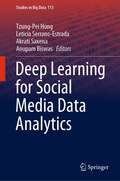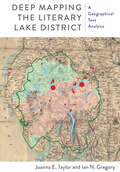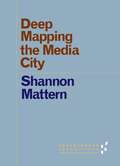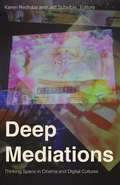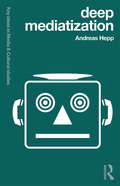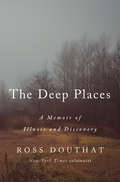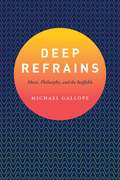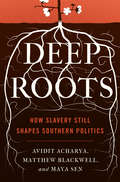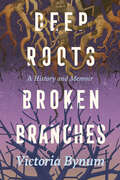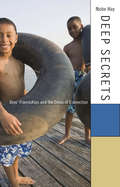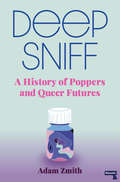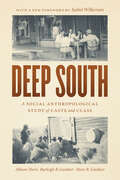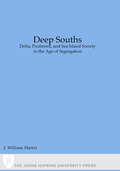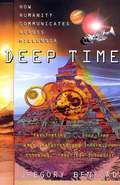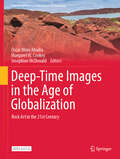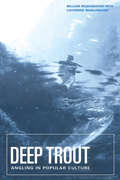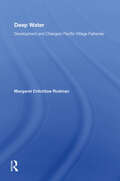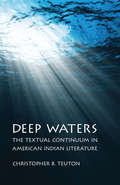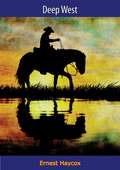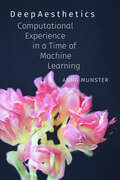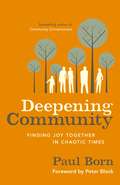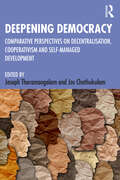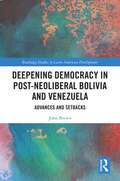- Table View
- List View
Deep Learning for Social Media Data Analytics (Studies in Big Data #113)
by Tzung-Pei Hong Leticia Serrano-Estrada Akrati Saxena Anupam BiswasThis edited book covers ongoing research in both theory and practical applications of using deep learning for social media data. Social networking platforms are overwhelmed by different contents, and their huge amounts of data have enormous potential to influence business, politics, security, planning and other social aspects. Recently, deep learning techniques have had many successful applications in the AI field. The research presented in this book emerges from the conviction that there is still much progress to be made toward exploiting deep learning in the context of social media data analytics. It includes fifteen chapters, organized into four sections that report on original research in network structure analysis, social media text analysis, user behaviour analysis and social media security analysis. This work could serve as a good reference for researchers, as well as a compilation of innovative ideas and solutions for practitioners interested in applying deep learning techniques to social media data analytics.
Deep Mapping the Literary Lake District: A Geographical Text Analysis (Aperçus: Histories Texts Cultures)
by Joanna E. Taylor Ian N. GregoryEngland’s famed Lake District—best known as the place of inspiration for the Wordsworths, Samuel Taylor Coleridge, and other Romantic-era writers—is the locus of this pioneering study, which implements and critiques a new approach to literary analysis in the digital age. Deploying innovative methods from literary studies, corpus linguistics, historical geography, and geographical information science, Deep Mapping the Literary Lake District combines close readings of a body of writing about the region from 1622-1900 with distant approaches to textual analysis. This path-breaking volume exemplifies interdisciplinarity, demonstrating how digital humanities methodologies and geospatial tools can enhance our appreciation of a region whose topography has been long recognized as fundamental to the shape of the poetry and prose produced within it.
Deep Mapping the Media City (Forerunners: Ideas First)
by Shannon MatternGoing beyond current scholarship on the &“media city&” and the &“smart city,&” Shannon Mattern argues that our global cities have been mediated and intelligent for millennia. Deep Mapping the Media City advocates for urban media archaeology, a multisensory approach to investigating the material history of networked cities. Mattern explores the material assemblages and infrastructures that have shaped the media city by taking archaeology literally—using techniques like excavation and mapping to discover the modern city&’s roots in time.Forerunners: Ideas First is a thought-in-process series of breakthrough digital publications. Written between fresh ideas and finished books, Forerunners draws on scholarly work initiated in notable blogs, social media, conference plenaries, journal articles, and the synergy of academic exchange. This is gray literature publishing: where intense thinking, change, and speculation take place in scholarship.
Deep Mediations: Thinking Space in Cinema and Digital Cultures
by Karen Redrobe Jeff ScheibleThe preoccupation with &“depth&” and its relevance to cinema and media studiesFor decades the concept of depth has been central to critical thinking in numerous humanities-based disciplines, legitimizing certain modes of inquiry over others. Deep Mediations examines why and how this is, as scholars today navigate the legacy of depth models of thought and vision, particularly in light of the &“surface turn&” and as these models impinge on the realms of cinema and media studies.The collection&’s eighteen essays seek to understand the decisive but evolving fixation on depth by considering the term&’s use across a range of conversations as well as its status in relation to critical methodologies and the current mediascape. Engaging contemporary debates about new computing technologies, the environment, history, identity, affect, audio/visual culture, and the limits and politics of human perception, Deep Mediations is a timely interrogation of depth&’s ongoing importance within the humanities. Contributors: Laurel Ahnert; Taylor Arnold, U of Richmond; Erika Balsom, King&’s College London; Brooke Belisle, Stony Brook University; Jinhee Choi, King&’s College London; Jennifer Fay, Vanderbilt U; Lisa Han, UC Santa Barbara; Jean Ma, Stanford U; Shaka McGlotten, Purchase College-SUNY; Susanna Paasonen, U of Turku, Finland; Jussi Parikka, U of Southampton; Alessandra Raengo, Georgia State U; Pooja Rangan, Amherst College; Katherine Rochester, VIA Art Fund in Boston; Karl Schoonover, University of Warwick (UK); Jordan Schonig, Michigan State U; John Paul Stadler, North Carolina State U; Nicole Starosielski, New York U; Lauren Tilton, U of Richmond.
Deep Mediatization: Key Ideas in Media & Cultural Studies (Key Ideas in Media & Cultural Studies)
by Andreas HeppAndreas Hepp takes an integrative look at one of the biggest questions in media and communications research: how digital media is changing society. Often, such questions are discussed in isolation, losing sight of the overarching context in which they are situated. Hepp has developed a theory of the re-figuration of society by digital media and their infrastructures, and provides an understanding of how profound today’s media-related changes are, not only for institutions, organizations and communities, but for the individual as well. Rooted in the latest research, this book does not stop at a description of media-related change; instead, it raises the normative challenge of what deep mediatization should look like so that it might just stimulate a 'good life' for all. Providing original and critical research, the book introduces deep mediatization to students of media and cultural studies, as well as neighboring disciplines like sociology, political science and other cognate disciplines.
The Deep Places: A Memoir of Illness and Discovery
by Ross DouthatIn this vulnerable, insightful memoir, the New York Times columnist tells the story of his five-year struggle with a disease that officially doesn't exist, exploring the limits of modern medicine, the stories that we unexpectedly fall into, and the secrets that only suffering reveals.&“A powerful memoir about our fragile hopes in the face of chronic illness.&”—Kate Bowler, bestselling author of Everything Happens for a Reason In the summer of 2015, Ross Douthat was moving his family, with two young daughters and a pregnant wife, from Washington, D.C., to a sprawling farmhouse in a picturesque Connecticut town when he acquired a mysterious and devastating sickness. It left him sleepless, crippled, wracked with pain--a shell of himself. After months of seeing doctors and descending deeper into a physical inferno, he discovered that he had a disease which according to CDC definitions does not actually exist: the chronic form of Lyme disease, a hotly contested condition that devastates the lives of tens of thousands of people but has no official recognition--and no medically approved cure.From a rural dream house that now felt like a prison, Douthat's search for help takes him off the map of official medicine, into territory where cranks and conspiracies abound and patients are forced to take control of their own treatment and experiment on themselves. Slowly, against his instincts and assumptions, he realizes that many of the cranks and weirdos are right, that many supposed "hypochondriacs" are victims of an indifferent medical establishment, and that all kinds of unexpected experiences and revelations lurk beneath the surface of normal existence, in the places underneath.The Deep Places is a story about what happens when you are terribly sick and realize that even the doctors who are willing to treat you can only do so much. Along the way, Douthat describes his struggle back toward health with wit and candor, portraying sickness as the most terrible of gifts. It teaches you to appreciate the grace of ordinary life by taking that life away from you. It reveals the deep strangeness of the world, the possibility that the reasonable people might be wrong, and the necessity of figuring out things for yourself. And it proves, day by dreadful day, that you are stronger than you ever imagined, and that even in the depths there is always hope.
Deep Refrains: Music, Philosophy, and the Ineffable
by Michael GallopeWe often say that music is ineffable, that it does not refer to anything outside of itself. But if music, in all its sensuous flux, does not mean anything in particular, might it still have a special kind of philosophical significance? In Deep Refrains, Michael Gallope draws together the writings of Arthur Schopenhauer, Friedrich Nietzsche, Ernst Bloch, Theodor Adorno, Vladimir Jankélévitch, Gilles Deleuze, and Félix Guattari in order to revisit the age-old question of music’s ineffability from a modern perspective. For these nineteenth- and twentieth-century European philosophers, music’s ineffability is a complex phenomenon that engenders an intellectually productive sense of perplexity. Through careful examination of their historical contexts and philosophical orientations, close attention to their use of language, and new interpretations of musical compositions that proved influential for their work, Deep Refrains forges the first panoptic view of their writings on music. Gallope concludes that music’s ineffability is neither a conservative phenomenon nor a pious call to silence. Instead, these philosophers ask us to think through the ways in which music’s stunning force might address, in an ethical fashion, intricate philosophical questions specific to the modern world.
Deep Roots: How Slavery Still Shapes Southern Politics (Princeton Studies in Political Behavior #6)
by Avidit Acharya Matthew Blackwell Maya SenThe lasting effects of slavery on contemporary political attitudes in the American SouthDespite dramatic social transformations in the United States during the last 150 years, the South has remained staunchly conservative. Southerners are more likely to support Republican candidates, gun rights, and the death penalty, and southern whites harbor higher levels of racial resentment than whites in other parts of the country. Why haven't these sentiments evolved or changed? Deep Roots shows that the entrenched political and racial views of contemporary white southerners are a direct consequence of the region's slaveholding history, which continues to shape economic, political, and social spheres. Today, southern whites who live in areas once reliant on slavery—compared to areas that were not—are more racially hostile and less amenable to policies that could promote black progress. Highlighting the connection between historical institutions and contemporary political attitudes, the authors explore the period following the Civil War when elite whites in former bastions of slavery had political and economic incentives to encourage the development of anti-black laws and practices. Deep Roots shows that these forces created a local political culture steeped in racial prejudice, and that these viewpoints have been passed down over generations, from parents to children and via communities, through a process called behavioral path dependence. While legislation such as the Civil Rights Act and the Voting Rights Act made huge strides in increasing economic opportunity and reducing educational disparities, southern slavery has had a profound, lasting, and self-reinforcing influence on regional and national politics that can still be felt today.A groundbreaking look at the ways institutions of the past continue to sway attitudes of the present, Deep Roots demonstrates how social beliefs persist long after the formal policies that created those beliefs have been eradicated.
Deep Roots, Broken Branches: A History and Memoir (Willie Morris Books in Memoir and Biography)
by Victoria BynumBest known for her award-winning book The Free State of Jones: Mississippi’s Longest Civil War, historian Victoria Bynum turns now to her own history in this multigenerational American saga spanning from 1840 to 1979. Through meticulous historical research, personal letters, diaries, and the unpublished memoir of Mary Daniel Huckenpoehler, the author’s maternal grandmother, Bynum examines five generations within the broader context of the nation’s history, navigating pivotal events such as First Wave immigration, the Civil War, the Gilded Age, the Great Depression, two world wars, the Cold War, and beyond.Child of a mother from Waconia, Minnesota, and father from Jones County, Mississippi, Bynum blends a historian’s voice with personal experiences, intertwining her grandmother’s unpublished memoir and letters with her own role as a diarist and historian. She explores class, race, ethnicity, and gender dynamics. From the rise of Welsh immigrant ancestors in the Upper Midwest and the Gilded Age privileges of her grandmother’s upbringing to Bynum’s own tumultuous childhood in the 1950s and early 1960s as she is shuttled between Georgia, Mississippi, Minnesota, Florida, and California, Bynum grapples with numerous dangers of being raised in a volatile environment marked by alcohol-fueled violence, sexual degradation, and neglect. Against the backdrop of racial segregation, civil rights movements, and the Cold War, Deep Roots, Broken Branches traces the author’s coming-of-age journey, and the profound influence of her grandmother. Revealed through the lens and tensions of an Air Force family, Deep Roots, Broken Branches explores Bynum’s intellectual curiosity, voracious reading habits, and turbulent path through early motherhood, divorce, and higher education in California. Throughout, her grandmother remains a stabilizing force, offering inspiration and guidance. This book paints a vivid portrait of a southern identity’s growth amid personal challenges and broader societal shifts.
Deep Secrets: Boys' Friendships and the Crisis of Connection
by Niobe Way“Boys are emotionally illiterate and don’t want intimate friendships.” In this empirically grounded challenge to our stereotypes about boys and men, Niobe Way reveals the intense intimacy among teenage boys especially during early and middle adolescence. Boys not only share their deepest secrets and feelings with their closest male friends, they claim that without them they would go “wacko.” Yet as boys become men, they become distrustful, lose these friendships, and feel isolated and alone. Drawing from hundreds of interviews conducted throughout adolescence with black, Latino, white, and Asian American boys, Deep Secrets reveals the ways in which we have been telling ourselves a false story about boys, friendships, and human nature. Boys’ descriptions of their male friendships sound more like “something out of Love Story than Lord of the Flies.” Yet in late adolescence, boys feel they have to “man up” by becoming stoic and independent. Vulnerable emotions and intimate friendships are for girls and gay men. “No homo” becomes their mantra. These findings are alarming, given what we know about links between friendships and health, and even longevity. Rather than a “boy crisis,” Way argues that boys are experiencing a “crisis of connection” because they live in a culture where human needs and capacities are given a sex (female) and a sexuality (gay), and thus discouraged for those who are neither. Way argues that the solution lies with exposing the inaccuracies of our gender stereotypes and fostering these critical relationships and fundamental human skills.
Deep Sniff: A History of Poppers and Queer Futures
by Adam ZmithAdam Zmith reveals the long history of the quick rush from sniffing poppers.3, 2, 1... inhale, deep. From the Victorian infirmary and the sex clubs of the 1970s, poppers vapour has released the queer potential inside us all. This is the intriguing story of how poppers wafted out of the lab and into gay bars, corner shops, bedrooms and porn supercuts. Blending historical research with wry observation, Adam Zmith explores the cultural forces and improbable connections behind the power of poppers. What emerges is not just a history of pub raids, viral panics and pecs the size of dinner plates. It is a collection of fresh and provocative ideas about identity, sex, utopia, capitalism, law, freedom and the bodies that we use to experience the world. In Deep Sniff, what starts as a thoughtful enquiry into poppers becomes a manifesto for pleasure.
Deep South: A Social Anthropological Study of Caste and Class
by Allison Davis Burleigh B. Gardner Mary R. GardnerA classic examination of the lived realities of American racism, now with a new foreword from Pulitzer Prize winner Isabel Wilkerson. First published in 1941, Deep South is a landmark work of anthropology, documenting in startling and nuanced detail the everyday realities of American racism. Living undercover in Depression-era Mississippi—not revealing their scholarly project or even their association with one another—groundbreaking Black scholar Allison Davis and his White co-authors, Burleigh and Mary Gardner, delivered an unprecedented examination of how race shaped nearly every aspect of twentieth-century life in the United States. Their analysis notably revealed the importance of caste and class to Black and White worldviews, and they anatomized the many ways those views are constructed, solidified, and reinforced. This reissue of the 1965 abridged edition, with a new foreword from Pulitzer Prize winner Isabel Wilkerson—who acknowledges the book’s profound importance to her own work—proves that Deep South remains as relevant as ever, a crucial work on the concept of caste and how it continues to inform the myriad varieties of American inequality.
Deep South: A Social Anthropological Study of Caste and Class
by Allison Davis Burleigh B. Gardner Mary R. GardnerA classic examination of the lived realities of American racism, now with a new foreword from Pulitzer Prize winner Isabel Wilkerson. First published in 1941, Deep South is a landmark work of anthropology, documenting in startling and nuanced detail the everyday realities of American racism. Living undercover in Depression-era Mississippi—not revealing their scholarly project or even their association with one another—groundbreaking Black scholar Allison Davis and his White co-authors, Burleigh and Mary Gardner, delivered an unprecedented examination of how race shaped nearly every aspect of twentieth-century life in the United States. Their analysis notably revealed the importance of caste and class to Black and White worldviews, and they anatomized the many ways those views are constructed, solidified, and reinforced. This reissue of the 1965 abridged edition, with a new foreword from Pulitzer Prize winner Isabel Wilkerson—who acknowledges the book’s profound importance to her own work—proves that Deep South remains as relevant as ever, a crucial work on the concept of caste and how it continues to inform the myriad varieties of American inequality.
Deep Souths: Delta, Piedmont, and Sea Island Society in the Age of Segregation
by J. William HarrisFinalist for the Pulitzer Prize in HistoryCo-winner of the James A. Rawley Prize from the Organization of American HistoriansWinner of the Theodore Saloutos Memorial Book Prize from the Agricultural History SocietyDeep Souths tells the stories of three southern regions from Reconstruction to World War II: the Mississippi-Yazoo Delta, the eastern Piedmont of Georgia, and the Georgia Sea Islands and Atlantic coast. Though these regions initially shared the histories and populations we associate with the idea of a "Deep South"—all had economies based on slave plantation labor in 1860—their histories diverged sharply during the three generations after Reconstruction. With research gathered from oral histories, census reports, and a wide variety of other sources, Harris traces these regional changes in cumulative stories of individuals across the social spectrum. Deep Souths presents a comparative and ground-level view of history that challenges the idea that the lower South was either uniform or static in the era of segregation. By the end of the New Deal era, changes in these regions had prepared the way for the civil rights movement and the end of segregation.
Deep time: How Humanity Communicates Across Millennia
by Gregory BenfordHumanity's attempts to communicate with itself across ages and to communicate with other spieces across space
Deep-Time Images in the Age of Globalization: Rock Art in the 21st Century (Interdisciplinary Contributions to Archaeology)
by Oscar Moro Abadía Margaret W. Conkey Josephine McDonaldThis open access volume explores the impact of globalization on the contemporary study of deep-time art. The volume explores how early rock art research’s Eurocentric biases have shifted with broadened global horizons to facilitate new conversations and discourses in new post-colonial realities. The book uses seven main themes to explore theoretical, methodological, ethical, and practical developments that are orienting the study of Pleistocene and Holocene arts in the age of globalization. Compiling studies as diverse as genetics, visualization, with the proliferation of increasingly sophisticated archaeological techniques, means that vast quantities of materials and techniques are now incorporated into the analysis of the world’s visual cultures. Deep-Time Images in the Age of Globalization aims to promote critical reflection on the multitude of positive – and negative – impacts that globalization has wrought in rock art research. The volume brings new theoretical frameworks as well as engagement with indigenous knowledge and perspectives from art history. It highlights technical, methodological and interpretive developments, and showcases rock art characteristics from previously unknown (in the global north) geographic areas. This book provides comparative approaches on rock art globally and scrutinises the impacts of globalization on research, preservation, and management of deep-time art. This book will appeal to archaeologists, social scientists and art historians working in the field as well as lovers of rock art.
Deep Trout: Angling in Popular Culture
by William WashabaughOn the surface, fishing is all about casting, catching and communing with nature, but on a deeper level, the sport is filled with mysteries and contradictions. Why do people fish? How does a desire to return to nature go hand in hand with high-tech gadgetry? How is it possible to see other people's fishing as despoiling nature but not one's own? What does the long and complex history of the sport reveal? Like so much else in life, what fishing says about society and the people in it -- both past and present -- is hidden from view and almost never discussed. This book is a considered foray into the leisure sport of fishing by an avid fisherman who is also a professional anthropologist. Those who enjoy the sport tend to extol its naturalness - fishing enables them to commune with nature at its most primeval. However, if it's called natural, it's probably a great spot to trawl for clues as to how people manage larger cosmic issues. ‘Call it natural,' the author quips, ‘and the anthropologists will come.' Is fishing an uncomplicated activity, or is it deeply meaningful? What does it say about culture? Is the recent resurgence of interest in the sport simply a reflection of more disposable incomes and more leisure time? What is the connection between fishing and Santa Claus? fishing and flamenco? And finally, what is the best way to kiss a trout? Unlike most books on fishing, which focus on the tale or on ‘how-to', this book shows that there is much more lurking beneath the surface than fish.
Deep Water: Development And Change In Pacific Village Fisheries
by Margaret C RodmanThis text looks at the importance of fisheries and their utilisation, geopolitics and the political economy throughout the island states of the Pacific. This is an account of fisheries development programs in two Vanuatu villages. The author's goal is to provide an insight into the perspective of rural Ni-Vanuatu on government projects designed to commoditize village fishing.
Deep Waters: The Textual Continuum in American Indian Literature
by Christopher B. TeutonWeaving connections between indigenous modes of oral storytelling, visual depiction, and contemporary American Indian literature, Deep Waters demonstrates the continuing relationship between traditional and contemporary Native American systems of creative representation and signification. Christopher B. Teuton begins with a study of Mesoamerican writings, Diné sand paintings, and Haudenosaunee wampum belts. He proposes a theory of how and why indigenous oral and graphic means of recording thought are interdependent, their functions and purposes determined by social, political, and cultural contexts. The center of this book examines four key works of contemporary American Indian literature by N. Scott Momaday, Gerald Vizenor, Ray A. Young Bear, and Robert J. Conley. Through a textually grounded exploration of what Teuton calls the oral impulse, the graphic impulse, and the critical impulse, we see how and why various types of contemporary Native literary production are interrelated and draw from long-standing indigenous methods of creative representation. Teuton breaks down the disabling binary of orality and literacy, offering readers a cogent, historically informed theory of indigenous textuality that allows for deeper readings of Native American cultural and literary expression.
Deep West
by Ernest HaycoxJUSTICE IS DEALT THE WINNING HANDA steer should only have one brand. When it’s got two, that’s rustlin’. And rustlin’ is the biggest kind of trouble round about Granite Canyon...unless you’re talking dead!When a range detective from the Cattleman’s Association turns up slung across the back of his horse like a piece of dead meat with a couple of bullet holes in him, Jim Benbow figures he’s got trouble. Benbow reckons Cash Gore is behind both the rustlin’ and the murder. And rumor has it that Benbow’s friend Clay Brand is working for Gore. But friend or not, no one cheats Benbow of The Hat. If any sidewinder tries it, he’ll get justice from a bullet or a hangman’s knot.Benbow knows he can finger the gunhands...but time is running out. A showdown is inevitable and when it comes, the renegades will feel the cold fury of lawfulness from a man marked for death!
DeepAesthetics: Computational Experience in a Time of Machine Learning (Thought in the Act)
by Anna MunsterComputation has now been reconfigured by machine learning: those technical processes and operations that yoke together statistics and computer science to create artificial intelligence (AI) by furnishing vast datasets to learn tasks and predict outcomes. In DeepAesthetics, Anna Munster examines the range of more-than-human experiences this transformation has engendered and considers how those experiences can be qualitative as well as quantitative. Drawing on process philosophy, Munster approaches computational experience through its relations and operations. She combines deep learning—the subfield of machine learning that uses neural network architectures—and aesthetics to offer a way to understand the insensible and frequently imperceptible forms of nonlinear and continuously modulating statistical function. Attending to the domains and operations of image production, statistical racialization, AI conversational agents, and critical AI art, Munster analyzes how machine learning is operationally entangled with racialized, neurotypical, and cognitivist modes of producing knowledge and experience. She approaches machine learning as events through which a different sensibility registers, one in which AI is populated by oddness, disjunctions, and surprises, and where artful engagement with machine learning fosters indeterminate futures.
Deepening Community
by Paul BornCommunity shapes our identity, quenches our thirst for belonging, and bolsters our physical, mental, emotional, and economic health. But in the chaos of modern life, community ties have become unraveled, leaving many feeling afraid or alone in the crowd, grasping at shallow substitutes for true community. In this thoughtful and moving book, Paul Born describes the four pillars of deep community: sharing our stories, taking the time to enjoy one another, taking care of one another, and working together for a better world. To show the role each of these plays, he shares his own stories--as a child of refugees and as a longtime community activist. It's up to us to create community. Born shows that the opportunity is right in front of us if we have the courage and conviction to pursue it.
Deepening Democracy: Comparative Perspectives on Decentralization, Cooperativism and Self-Managed Development
by Joseph Tharamangalam and Jos ChathukulamThis book examines the renewed interest and commitment that countries across the world have shown in recent decades towards adopting models of decentralising, or "downsizing" the state, and moving towards more participatory models of government. It examines systems of decentralised development such as self-managing co-operatives from a global and comparative perspective with a focus on developing countries. Drawing on examples from Kerala and a few other states in India, as well as Cuba, Bangladesh and South Africa among other countries, the book offers critical perspectives on the positive impacts of these experiments and the promises these offer for the future. It discusses the challenges of implementing these models, how well these work in coordination with the civil society and the state, issues of transparency and democratic oversight as well as corruption and capture of power due to entrenched structures of inequality. The volume analyses welfare and development models and self-management interventionsin countering the effects of the COVID-19 pandemic. It also looks at the meritsand demerits of decentralisation in countering the global socioeconomic and environmental crisis and the rise of authoritarian populism in many countries. The book will be of interest to students and researchers of development studies, political science, business, community development, social justice as well as of co-operative management programmes. It will also appeal to students of political economy as well as development professionals, think tanks and policymakers.
Deepening Democracy in Post-Neoliberal Bolivia and Venezuela: Advances and Setbacks (Routledge Studies in Latin American Development)
by John BrownThis book provides a timely and nuanced analysis of the successes and shortcoming of efforts to move beyond market democracy in Bolivia and Venezuela. A twin crisis of democratic representation and socio-economic precarity created space for anti-system outsiders to emerge on the left flank of traditional party-systems in Bolivia and Venezuela, paving the way for a "post-neoliberal" democratization process. Over the course of the projects headed by Evo Morales in Bolivia and Hugo Chávez and his successor Nicolás Maduro in Venezuela, however, power struggles emerged between a recalcitrant elite, the left-led government, and organized popular sectors. These tensions shaped the pathways that processes followed, with simultaneous democratization and de-democratization occurring whereby a partial deepening and extending of democratic quality for popular sectors was accompanied by the bending of liberal norms. Comparing the varying balance and forms of power between competing actors, this book offers a novel and rich explanation of the partial and stuttering efforts to advance a post-neoliberal democracy in Bolivia and Venezuela. Bringing important insights on the reasons for the emergence of anti-system leaders and parties, the impact that they have on the quality of democracy, and how progressive governments interact with social movements, this book will be of interest to researchers studying Latin America, as well as those specializing in development and political science more broadly.
Deeper Blues: The Life, Songs, and Salvation of Cornbread Harris
by Andrea SwenssonThe emotional, epic story of James &“Cornbread&” Harris—a self-proclaimed &“blessed dude&” and one of Minneapolis&’s most influential musicians From the heart of the Minnesota blues comes the story of James &“Cornbread&” Harris Jr., the songwriter, pianist, and consummate bluesman whose seventy years making music helped to shape the Minneapolis Sound. &“I am a blessed dude,&” Cornbread tells Andrea Swensson, taking us along on his musical journey from a first &“gig&” entertaining his fellow soldiers during World War II to his subsequent years playing music for audiences across Minnesota. Following Cornbread&’s extraordinary life story, Deeper Blues is a unique history of Minnesota music that evolves into a heartfelt tale of reconciliation and forgiveness, all to the tune of the legendary musician&’s signature sound. Cornbread&’s career started in the 1950s, when he played with the Augie Garcia Quintet and cowrote their hit &“Hi Ho Silver.&” A tireless entertainer, he has been performing live ever since, influencing an entire generation of musicians credited with putting Minneapolis on the map in the 1980s—including his long-estranged son, Grammy-winning Rock and Roll Hall of Famer James &“Jimmy Jam&” Harris III. Going beyond the music, Deeper Blues turns toward family, atonement, and peace when Cornbread reunites with Jimmy Jam after a five-decade separation and they perform together on stage. Through conversations with Cornbread, Jimmy Jam, and many others, Swensson reveals a story of perseverance and unfailing grace, a firsthand account of making music in the face of racism and segregation, and a hard-won acceptance of the personal sacrifices that are often required when dedicating one&’s life to making music. As the man himself says, &“All of my hardships ended up to be blessings.&” A rich mix of present-day anecdotes and historical vignettes, animated by voices from Cornbread&’s life and the Twin Cities music scene, underscored by the bluesman&’s original lyrics of heartache and hope, and featuring never-before-seen photographs of Cornbread and Jimmy Jam, Deeper Blues tells a singular story—one imprinted on the history, heart, and soul of the Minneapolis Sound.
